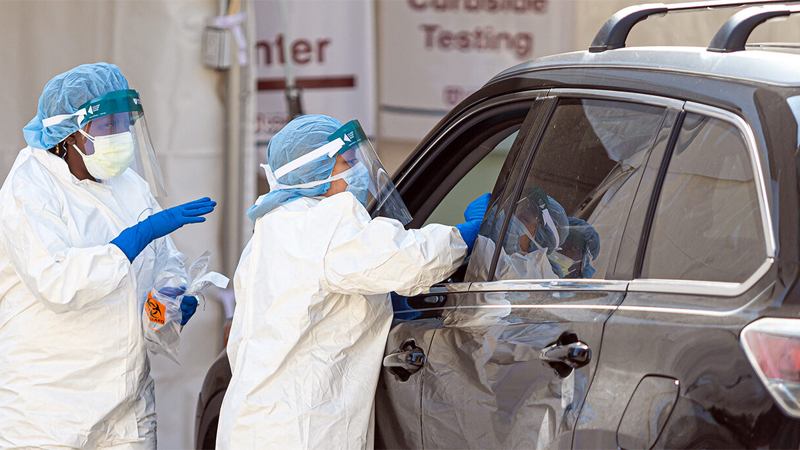The global case tally of confirmed cases of the coronavirus-borne illness COVID-19 climbed above 106 million on Monday, with the U.S. accounting for more than 27 million of that total, even as cases continue to decline and the post-holiday surge abates.
The U.S. added 87,889 new cases on Sunday, according to a New York Times tracker, and at least 1,301 people died, although those numbers may be underreported given reduced staffing at hospitals on weekends. The U.S. has averaged 118,016 new cases a day in the past week, down 31% from the average two weeks ago.
Hospitalizations are also steadily declining, according to the COVID Tracking Project. There were 81,439 COVID-19 patients in U.S. hospitals on Sunday, down from 84,233 a day earlier. The number has now declined for 24 straight days and stands at its lowest level since Nov. 18. Average daily cases are now down 60.3% from their peak and average daily hospitalizations are down 33.3%, according to Raymond James analyst Chris Meekins.
“While time is passing from the frequent congregations of the holiday season which contribute to increased cases, and a larger portion of the population (up to one-third) likely already contracting the virus; in our view vaccinations are the leading contributor to the improving state of the pandemic in the U.S.,” Meekins wrote in a note to clients.
And while for now, vaccine demand is outpacing supply, “that will likely change within two months when it will become critical to convince the half of the population not as eager to get the vaccine that they need it despite the lower case counts,” he wrote.
Dr. Ashish Jha, dean and professor of health services, policy and practice at the Brown University School of Public Health, said the U.S. is at a crucial phase given the new variants of the virus that are circulating and that are more infectious than the original virus.
“This is not the time to get sick — not that it ever was the time to get sick,” he told MSNBC in an interview. “But we’re so close to the finish line. We’re asking people to hold on, and we’re not asking people to hold on forever. We’re talking about the next couple of months.“
Jha is optimistic that even if the vaccine developed by AstraZeneca PLC with Oxford University is less effective in dealing with the variant that emerged in South Africa, the other authorized vaccines — the one developed by Pfizer Inc. and German partner BioNTech SE , and one developed by Moderna Inc. — will work.
The one-dose regimen developed by Johnson & Johnson which is under review for authorization is another reason for hope, he said. The other vaccines all require two doses, taken several weeks apart.
“And we can update the vaccines,” he said, a process than can be achieved in about six weeks and then tested.
South Africa has suspended its plans to inoculate front-line health care workers with the Oxford-AstraZeneca vaccine after a small clinical trial suggested that it isn’t effective in preventing mild to moderate illness from the variant dominant in the country, the Associated Press reported.
South Africa received its first 1 million doses of the AstraZeneca vaccine last week and was expected to begin giving jabs to health care workers in mid-February. The disappointing early results indicate that an inoculation drive using the AstraZeneca vaccine may not be useful.
“The AstraZeneca vaccine appeared effective against the original strain, but not against the variant,” health minister Zweli Mkhize said on Sunday. “We have decided to put a temporary hold on the rollout of the vaccine … more work needs to be done.”
The World Health Organization is holding a meeting Monday about the latest news from South Africa.
(Market Watch)


